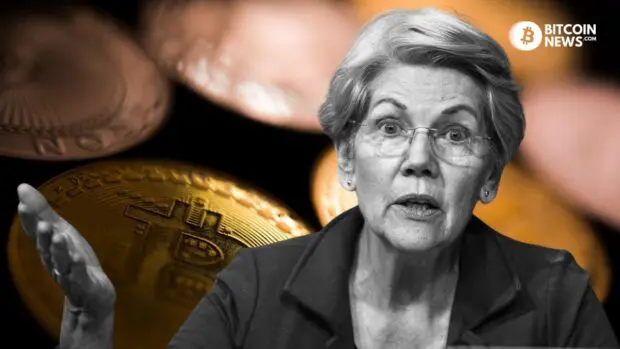Senator Elizabeth Warren from Massachusetts has raised concerns over the digital asset industry’s recruitment of former government officials to influence policymaking. Her criticism stems from what she perceives as a concerted effort to block regulations aimed at curbing industry’s alleged role in funding terrorist organizations like Hamas.
Related reading: Warren Can’t “Throw Darts” At Bitcoin Because It’s Just Code
Warren’s Allegations
In a series of letters directed at prominent entities within the digital asset space – including Coinbase, the Blockchain Association, and Coin Center – Senator Warren highlighted the industry’s reliance on ex-defense, national security, and law enforcement officials. She accused these firms and lobbying groups of impeding bipartisan efforts to regulate digital assets.
Warren referred to reports, including a Politico article, citing the digital asset industry’s employment strategy. The industry’s recruitment of former officials has been portrayed as an attempt to influence federal policies, specifically those addressing digital asset’s involvement in illicit finance.
The Industry’s Defense
The Blockchain Association, Coinbase, and Coin Center responded to Warren’s allegations, defending their engagement with former officials. They argued that collaborating with experts is a fundamental right and essential for advocating against legislative proposals deemed detrimental.
Neeraj Agrawal of Coin Center stated:
“[…] It is the exercise of the fundamental right to freely associate and petition the government. No one should apologize for doing it. Resorting to questioning motives often reflects an inability to prevail on the merits of an argument itself.”
Kristin Smith, CEO of the Blockchain Association, emphasized that these partnerships aim to align with law enforcement to combat terrorism and safeguard national security. The industry contends that their intent is not to undermine bipartisan efforts but rather to ensure a fair and inclusive financial system.
She added:
“people are drawn to work in the crypto industry because they value freedom, sovereignty of the individual, and permissionless innovation.”
Kara Calvert, Coinbase head of U.S. policy, stated the experts in national security and law enforcement who are employed by the the exchange “do not deserve to be maligned as they work to keep our nation strong and safe.”
Ethical Concerns and Industry Pushback
Warren also raised ethical questions about the ‘revolving door’ practice, where ex-officials transition to lucrative private sector roles. She urged transparency from digital asset firms regarding their utilization of such practices.
She wrote:
“fighting tooth and nail to stonewall common sense rules designed to restrict the use of crypto for terror financing – rules that could cut into crypto company profits,”
In response, Kristin Smith defended the industry’s objectives and criticized Warren’s approach. She expressed disappointment, alleging that Warren sought to discredit the industry’s pursuit of a more inclusive financial landscape.
Warren’s Ongoing Critique
This isn’t the first time Warren has voiced concerns about digital assets’ regulatory challenges. Her push for bipartisan support in crafting legislation targeting anti-money laundering measures within the market has been ongoing.
Warren’s persistence in scrutinizing the industry’s use of former officials and lobbying tactics signals a broader debate on the intersection of policymaking, private interests, and ethical practices.
This ongoing discourse underscores the complexities of regulating a rapidly evolving financial landscape. While Warren seeks greater transparency and ethical standards, the industry defends its collaboration with former officials as crucial for advancing policies that promote financial freedom while addressing regulatory concerns.
About 66% of ex-members from the 115th U.S. Congress, concluding in January 2019, pursued careers beyond politics. A study by Public Citizen in 2019 revealed that a significant portion of these individuals impacted federal policies by engaging in lobbying or strategic consulting roles.
As the dialogue continues, the clash between these perspectives emphasizes the need for a balanced approach that ensures both regulatory clarity and industry innovation in the realm of digital assets.










